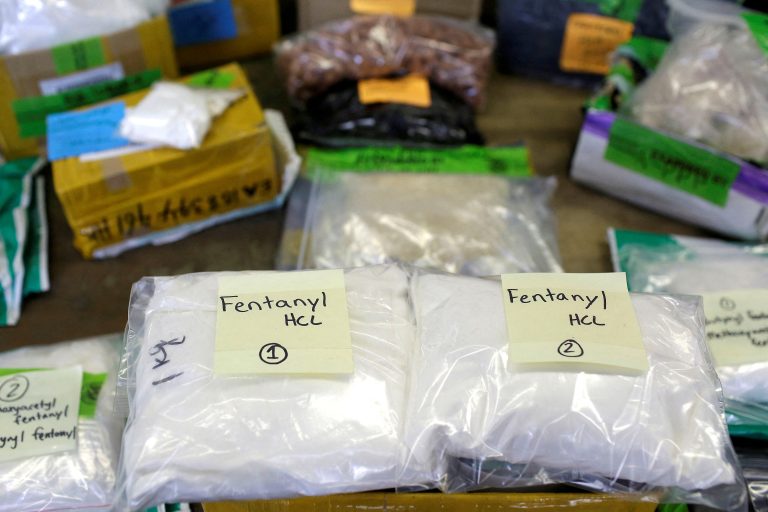The U.S. Justice Department has accused eight Chinese nationals and four companies of supplying raw materials for fentanyl production — an initiative to gain better control over the devastating opioid crisis.
Persecutors on Friday, June 23, claimed the accused had illegally produced or trafficked chemical precursors to create fentanyl. This highly addictive opioid has ransacked the nation and already claimed thousands of lives in the U.S.
In the Eastern District of New York, prosecutors announced the unsealing of an indictment against the China-based Hubei Amarvel Biotech, along with its executives Wang Qingzhou, 35, Chen Yiyi, 31, and Fnu Lnu, also known as Er Yang, with fentanyl trafficking, precursor chemical importation, and money laundering offenses.
Wang and Chen were arrested on June 8 by undercover Drug Enforcement Administration (DEA) agents posing as potential buyers of the drugs. The two are detained in Honolulu, awaiting transportation to New York court, where they must answer the charges against them. Yang remains at large.
Federal indicters in Manhattan announced the unsealing of two more indictments against three other Chinese companies and individuals accused of conspiring to manufacture and distribute fentanyl.
The Sinaloa lead
Success
You are now signed up for our newsletter
Success
Check your email to complete sign up
The companies at the heart of the three separate indictments were Chinese companies suspected of being behind the plan by setting up a raw material production and sales line of synthetic drugs managed to sell it to associates of Mexico’s infamous Sinaloa drug cartel, who in turn operated to dump it on the U.S. market.
Earlier this year, the Justice Department charged leaders of the Sinaloa cartel, including three sons of Joaquin “El Chapo” Guzman, the onetime cartel leader now imprisoned in the U.S., with running a fentanyl trafficking operation fueled by these Chinese chemical companies.
Prosecutors alleged that the Chinese companies, one of which operated under the moniker of Hebei Sinaloa Trading Co., offered semi-fabricated synthetic drugs for sale on social media in Mexico and the U.S.
Opium wars revisited
Observers have long noted the similarities between the Communist Chinese export of fentanyl to the U.S. and the opium trade of the 1800s, in which Western imperial powers — chiefly the UK — flooded Qing-dynasty China with narcotics, and even fought two Opium Wars to continue the flow of drugs.
Regardless, the recent U.S. indictment is a first of its kind in which authorities attempted to round up the entire supply chain to its origin — China — in a coordinated action involving many special police divisions, intelligence agencies, and federal prosecutors working together.
READ MORE:
- China-based Fentanyl, Narcotic Suppliers, Sell Online Via Digital Currency, Blockchain Analysts Find
- North America’s Fentanyl Epidemic Worsened in 2022, Fueled By China and Mexican Drug Cartels
- Governor Abbott Warns 800 Percent Increase in Fentanyl Flow Into Texas, China Culpable
- US Offers $5 Million Bounty For Wanted Chinese Fentanyl Trafficker
The Chinese, using embassy spokesperson Liu Pengyu said such “long-arm jurisdiction” would create more obstacles for China-U.S. counter-narcotics cooperation.
The People’s Republic of China (PRC) on Saturday (June 24) urged the U.S. to stop using what it said were fentanyl-related pretexts to sanction and prosecute Chinese companies and citizens and demanded the immediate release of those who were “illegally arrested.”
“China urges the U.S. side to stop dumping blame and to stop smear attacks on China,” the ministry said in a statement.
Blinken returns empty-handed from China
The initiative came just after Antony Blinken, as the first U.S. Secretary of State, visited China for summit consultations and where Blinken said he pushed for a broader approach to fight the fentanyl crisis.
Both sides appeared keen to avoid further escalating the subcutaneous conflicts. This was reasonably successful by leaving hot topics such as Taiwan and the Ukraine crisis unaddressed.
Blinken also announced on June 23 that he would convene a virtual session on July 7 called Global Coalition to Address Synthetic Drug Threats with various government leaders and NGOs to jointly address the problem of flooding the market with synthetic drugs.
Reuters contributed to this report.
















